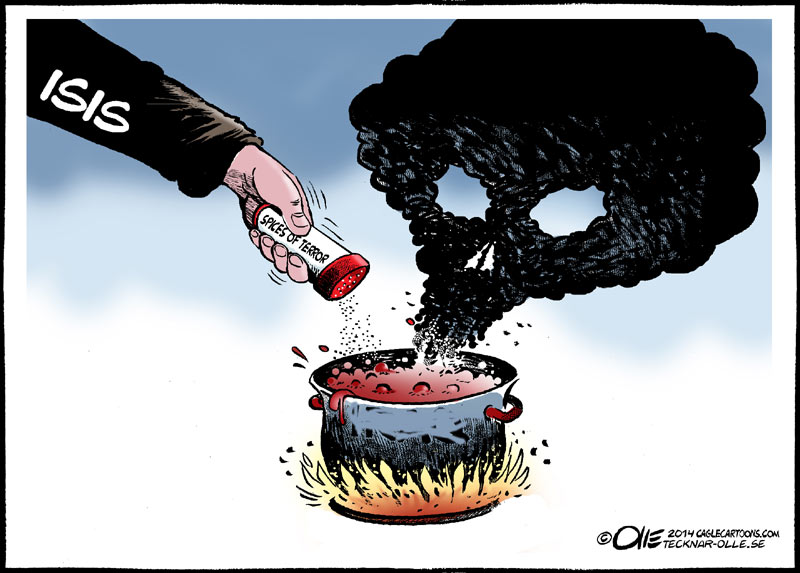
Here's a nagging worry for officials in the US, Europe and the wider West: Is post-Gaza and post-Moscow also pre-Olympics? I'm talking about the threat of terrorism, of course, and whether recent events will move it from the lower half of our anxiety pile back to the very top, especially in anticipation of soft targets such as the upcoming summer games in Paris.
The anxiety loop runs as follows. The sadistic attack by Hamas against Israel on Oct. 7 was so "successful" from a jihadist's point of view, it might re-energize other terrorist groups. And the death and suffering in the Gaza Strip caused by the massive Israeli response are now radicalizing a new generation of Muslims, some of whom may enlist in whatever form terrorist jihadism takes.
The recent and deadly assault on a concert hall in Moscow by ISIS-K, a branch of the Islamic State, opened yet another front in the global jihadist threat. Some American top brass believe that the US "remains target No. 1" for this group, which thrived after the botched American withdrawal from Afghanistan in 2021 and seeks to form a caliphate across Khorasan, a region spanning the "stans" of central Asia.
Even without these events, of course, the specter of jihadist terrorism was never gone. But if it was Washington's priority in the years following Al-Qaeda's attacks on Sept. 11, 2001, it has in recent years lost salience relative to other national-security threats, especially the more traditional menace of hostile states with armies and nukes, such as China, Russia or North Korea. In this year's Annual Threat Assessment of the US Intelligence Community, terrorism shows up on page 38 out of 40, behind problems such as fentanyl, money laundering, cyber crime and human trafficking.
That shift in perception is proof not of neglect but of the West's relative success. The US and its allies spent years degrading networks such as Al-Qaeda and the Islamic State and killing their leaders. The latter no longer controls any territory in its former cradle of Iraq and Syria, even if offshoots such as ISIS-K carry on elsewhere. Intelligence services have also become much more adept at spying out and disrupting plots. (The US, as well as Iran, warned the Kremlin about the ISIS-K plot, but was ignored.)
Nobody can rule out a resurgence of terrorism. That said, a lot suggests that jihadism, at least in the West, will keep evolving into a manageable threat, thinks Barak Mendelsohn, a terrorism scholar at Haverford College. Even if the number of Islamist terrorist groups is growing, he told me, they're also more fragmented than networks such as Al-Qaeda used to be in the 1990s, and often hate one another as much as they execrate the US.
Take ISIS-K again. It loathes the Taliban, its rivals for power in Afghanistan. It also hates all groups affiliated with Shia Islam, from Yemen's Houthis to Lebanon's Hezbollah and Iran's mullahs, all of whom it considers apostates. It detests all states it views as hostile to Sunnis, including Russia (which has propped up a Shia dictator in Syria and partnered with Tehran) as well as China (which brutally suppresses the Sunni Uyghurs in its Xinjiang Province). And it hates what Mendelsohn calls the "near enemy" — that is, the local regimes in places such as Tajikistan that it wants to conquer and convert to its caliphate.
The "far enemy" in the US thus has a lot of competition as a target, even aside from the counter-terrorism prowess it's honed over the years. For ISIS-K, it's far easier to attack Iran, say, as it did in January. (The US had tipped off Tehran about that strike too, just as it recently alerted Moscow.)
So the trend is away from transnational or global terrorism, in which jihadis try to build large networks to go after big targets including the US with outliers such as 9/11. Instead, terrorist attempts and attacks in the West will probably be smaller in scale, executed by sleeper cells or "lone wolves" — an alienated Muslim in Brussels, say, or even Michigan.
In regions such as Africa's Sahel, meanwhile, jihadist violence will metastasize. In the power vacuum of this region's failed states, a variety of groups, only loosely affiliated with transnational networks such as the Islamic State, are fighting sundry enemies, ranging from local regimes or juntas to rival clans, tribes and warlords. Islamic theology is only one of several motivations for strife. The strategic threat to the West is more likely to take the form of continued mass migration out of Africa than of cataclysmic terrorist attacks.
The geopolitical trend from unipolarity in the 1990s to multipolarity in this century should also diffuse the jihadists' former focus on the US as the far enemy. Russia, China and Iran are at least as much in some terrorists' crosshairs as the US, UK or France.
The splintering of global jihadism presents one opportunity for the West to keep terrorism relatively manageable. The common threat against all major powers, including US adversaries such as Russia and China, offers another. If Beijing, say, can be persuaded to cooperate against terrorism, this reciprocity could potentially build trust for future talks about nuclear arms control or threat reduction in the Taiwan Strait. That's another reason for Washington to continue warning even enemies about terrorist plots against them.
Overall, Mendelsohn told me, the US and its partners seem to have settled into an approach to terrorism that is mature. Like other evils, from White Supremacy to fentanyl, it's unlikely ever to go away, and must be permanently contained and managed. But the old pattern of cycling between complacency and overreaction appears to be broken. Even so, all eyes, ears, satellites and snoops must keep looking out for the next plot, whether it's in Khorasan or at the Olympics.
(COMMENT, BELOW)
Andreas Kluth is a columnist for Bloomberg Opinion. He was previously editor in chief of Handelsblatt Global and a writer for the Economist. He's the author of "Hannibal and Me."
Previously:
• 02/14/24: Ditch the 'Rules-Based International Order'
• 01/08/24: America has a new Axis of Evil to prevent
• 12/04/23: As Heinz and Henry, Kissinger brought Germany redemption
• 11/30/23: Biden's Gaza pause brings joy --- and anguish
• 11/09/23: The Biden Doctrine: Show strength, whisper restraint
• 11/02/23: Where's the United Nations in all this? Oh, right, nowhere
• 09/22/23: We all need to keep supporting Ukraine, Elon
• 09/22/23: Biden said the right things at the UN. That won't be enough
• 08/02/23: Russia outnumbers the US 10-to-1 in tactical nukes. Now what?
• 06/27/23: Putin's biggest mistakes in the Wagner uprising
• 05/31/23: Should Ukraine take the war into Russia?
• 05/08/23: Ukraine in NATO: The heart says yes, the head no
• 04/25/23: How NATO should deter Vladimir Putin's Russia
• 03/29/23: Putin ups the ante with nukes in Belarus
• 02/15/23: Russia's 'human wave attacks' are another step into hell
• 12/09/22: Germany just averted the Fourth Reich
• 11/28/22: Russia's mass abductions are genocide
• 10/21/22: If Putin orders a nuke, will his generals obey?
• 09/23/22: A decision tree for Biden if Putin goes nuclear
• 08/25/22: Putin wouldn't shrink from starting Chernobyl 2.0 in Ukraine
• 07/08/22: Ukraine has better heroes than this friend of fascism
• 06/10/22: Merkel will enter history as the Neville Chamberlain of our time
• 04/29/22: NATO needs to seal the deal with Sweden and Finland fast
• 01/24/22: Vladimir Putin has no time for your reality
• 01/06/22:Bombast, distance and distrust: Your guide to Ukraine talks
• 01/06/22: An international court decision forces all of us to debate who should get medical care if it must be rationed
• 12/08/21: A crisis of masculinity as robots replace men
• 11/03/21: In post — Merkel Europe, what is 'conservatism'?
• 11/03/21: In this nuclear arms race, China's hypersonic gliders are a wake — up call
• 07/16/21: By doggedly backing a Russian gas link, Angela Merkel has let down the U.S. and Europe — — — and left her successor only bad options
• 06/08/21:Will you have fewer friends after lockdown?
• 07/29/20: OK, boomer, we're gonna socialize you
• 07/09/20: The fight over a coronavirus vaccine will get ugly
• 05/26/20: The EU is entering a constitutional crisis


 Contact The Editor
Contact The Editor
 Articles By This Author
Articles By This Author